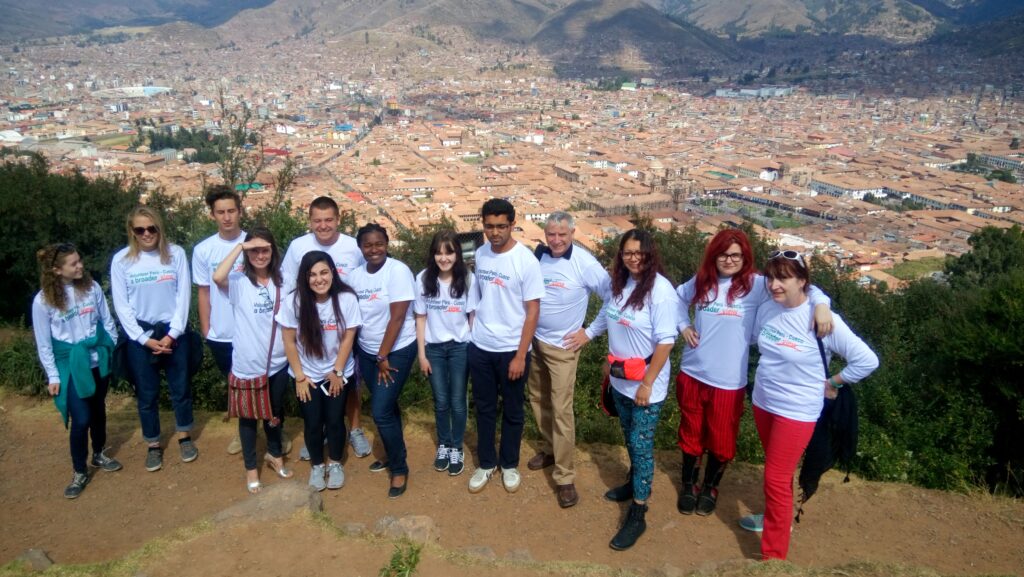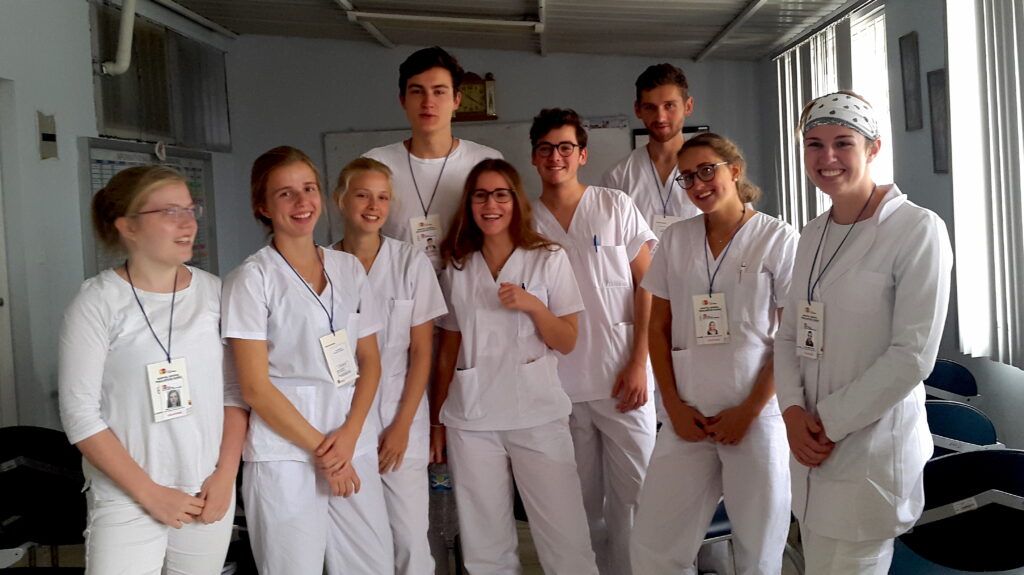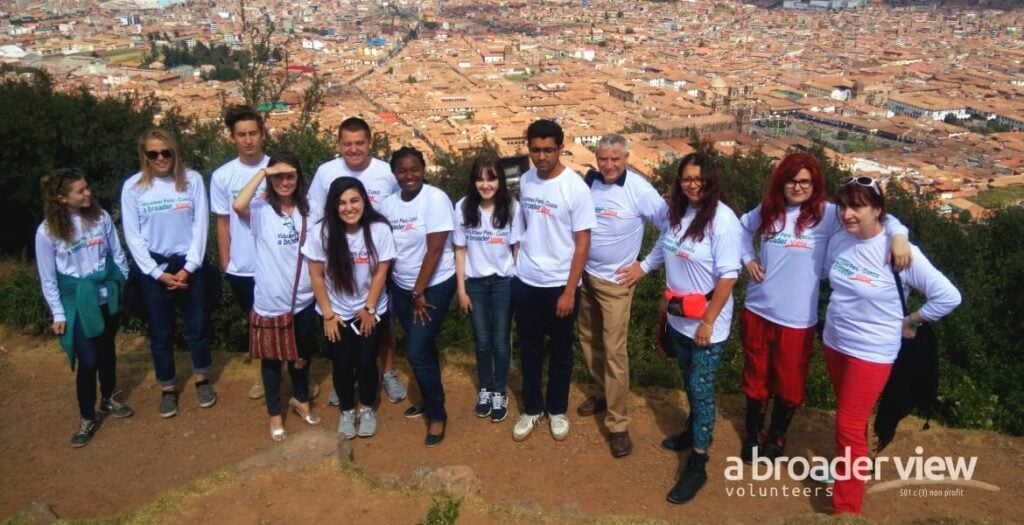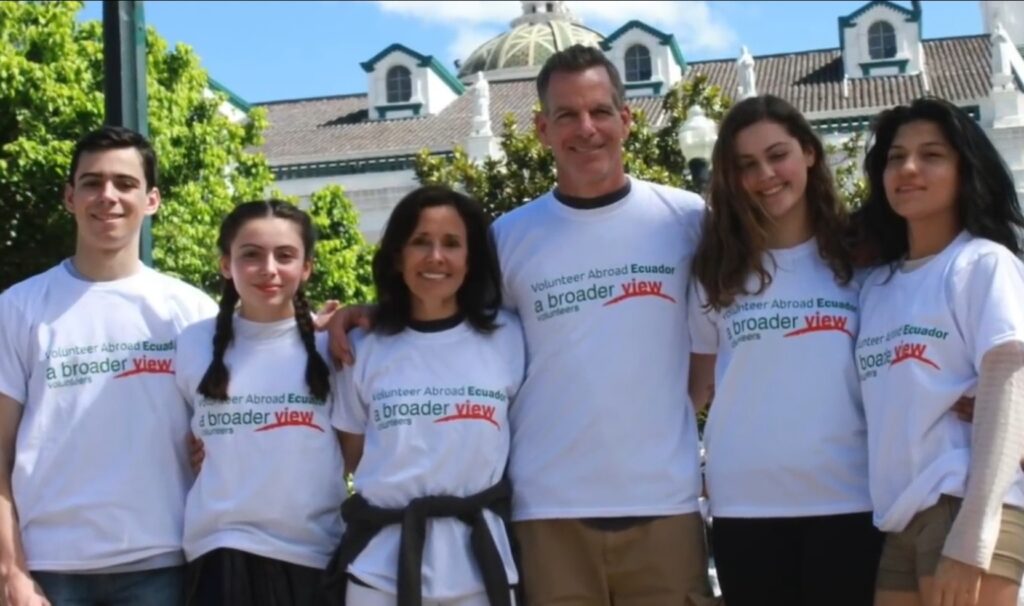Are you passionate about making a difference in the world? Do you dream of volunteering abroad to help those in need? If so, you might think that a limited budget could hold you back from pursuing your dreams. But fear not! Volunteering abroad on a budget is absolutely possible. With careful planning, research, and a bit of creativity, you can make the most of your limited funds and embark on a meaningful volunteer experience.
Volunteering abroad not only allows you to contribute to a cause you care about, but it also provides you with the opportunity to immerse yourself in a different culture, expand your horizons, and gain a unique perspective on the world. It’s a chance to step outside of your comfort zone, challenge yourself, and make lifelong memories.

In this article, we will guide you through the process of volunteering abroad on a budget. We will cover strategies for researching volunteer programs, budgeting effectively, finding affordable accommodation and transportation options, minimizing food expenses, and much more. So, let’s dive in and discover how you can make your dream of volunteering abroad a reality, even with limited funds!
Researching Volunteer Programs
When it comes to volunteering abroad on a budget, it’s crucial to do your research to ensure you find a program that aligns with your goals and financial constraints. Here are some key steps to follow when researching volunteer programs:
Defining Your Volunteer Goals
Before you start looking for a volunteer program, take a moment to define your goals and what you hope to achieve through your experience. Are you passionate about environmental conservation, working with children, or healthcare? Knowing your interests and areas of expertise will help you narrow down your options and find a program that aligns with your passions.
Choosing an Affordable Destination
One of the major factors in volunteering abroad on a budget is the destination you choose. Some countries have a lower cost of living, making it more affordable to live and volunteer there. Do some research on different destinations and consider factors such as accommodation costs, transportation expenses, and the overall cost of living. Look for countries where your budget can stretch further without compromising on the quality of your experience.
Finding Legitimate Volunteer Organizations
When researching volunteer programs, it’s crucial to ensure that you choose a legitimate and reputable organization. Unfortunately, there are some organizations out there that may take advantage of volunteers or provide minimal support. Here are some tips for finding legitimate volunteer organizations:
- Look for organizations with a long-standing reputation and positive reviews from past volunteers.
- Check if the organization is registered and accredited by relevant local authorities.
- Research the organization’s mission and values to ensure they align with your own.
By investing time in researching and selecting the right volunteer program, you can ensure that your time and money are well-spent, and you make a meaningful impact in the community you choose to serve.
“Volunteering abroad gives you the opportunity to immerse yourself in a new culture while making a positive difference in the lives of others. By researching different programs, you can find the perfect fit for your goals and budget.”
Budgeting for Volunteering Abroad
Volunteering abroad is a rewarding experience that allows you to make a positive impact on communities in need while immersing yourself in a new culture. However, one common concern that potential volunteers have is the cost associated with these programs. Fortunately, with proper planning and budgeting, it is possible to make the most of limited funds and still have a fulfilling volunteer experience. In this section, we will explore some tips and strategies to help you budget for volunteering abroad without breaking the bank.
Setting a Realistic Budget
Before embarking on your volunteering adventure, it is essential to set a realistic budget. Consider the following factors when determining your budget:
- Program Fees: Research and compare the program fees of different volunteer organizations to find one that fits your budget.
- Flights and Travel Insurance: Factor in the cost of round-trip flights and comprehensive travel insurance to ensure you are adequately covered.
- Accommodation and Meals: Estimate the cost of accommodation and meals during your volunteering period. This will vary depending on the destination and type of accommodation chosen.
- Visa and Vaccinations: Check the visa requirements for your chosen destination and include any associated costs. Remember to budget for any necessary vaccinations or medications.
- Personal Expenses: Plan for extra expenses such as local transportation, communication costs, and leisure activities.
By considering these factors and doing thorough research, you can create a realistic budget that covers all essential expenses during your volunteer program.
Fundraising and Seeking Sponsorships
If your budget is tight, consider supplementing your funds by fundraising or seeking sponsorships. Here are some ideas to help you with fundraising:
- Crowdfunding: Create an online fundraising campaign through platforms like GoFundMe or Kickstarter. Share your story, goals, and motivations to attract donations from friends, family, and even strangers who support your cause.
- Event Fundraisers: Organize events, such as bake sales, garage sales, or charity dinners, to raise money for your volunteer program. Engage your community and get them involved in your cause.
- Corporate Sponsorships: Reach out to local businesses or corporations and inquire about potential sponsorships. Many companies have corporate social responsibility programs and might be interested in supporting your volunteer efforts.
Remember to be proactive and creative when seeking sponsorships or fundraising. People are often willing to support a good cause, so don’t be afraid to ask for help.
Applying for Grants and Scholarships
Another option to consider is applying for grants and scholarships specifically aimed at funding volunteer programs abroad. Organizations such as the Rotary Foundation, Volunteer Forever, and GoAbroad offer a range of scholarships and grants to help individuals finance their volunteer experiences. Additionally, some universities and colleges may have travel grants available for students engaging in volunteer work. Research and apply for as many grants and scholarships as possible to increase your chances of receiving financial assistance.
“Remember, every small contribution counts. Don’t be discouraged if you don’t receive a full scholarship or grant. Piece together different sources of funding to reach your goal.”

Accommodation and Transportation
When you’re volunteering abroad on a budget, finding affordable accommodation and transportation options is crucial. By taking the time to research and plan ahead, you can maximize your limited funds and make the most of your experience. Here are some tips to help you save money on accommodation and transportation:
Exploring Cost-Effective Housing Options
- Hostels: Consider staying at hostels, which are budget-friendly and often have dormitory-style rooms. This is a great way to meet fellow travelers and potentially find travel buddies for sightseeing or exploring during your free time.
- Homestays: Another cost-effective option is to stay with a local family through a homestay program. This not only provides a unique cultural experience but can also be more affordable than hotels or guesthouses.
- Couchsurfing: If you’re open to the idea of staying with locals, Couchsurfing is a platform where people offer their couch or spare room for free. It’s a great way to connect with locals and save money on accommodation.
- Short-term Rentals: Consider renting an apartment or room through platforms like Airbnb or VRBO. Sometimes, you can find budget-friendly options, especially if you’re traveling with a group and can split the cost.
Utilizing Public Transportation
- Research Transportation Options: Before you arrive at your destination, research the public transportation options available. Look for information on buses, trains, trams, or metro systems, as these are usually more affordable than taxis or private transportation.
- City Passes or Travel Cards: Many cities offer discounted passes or travel cards that provide unlimited access to public transportation for a certain period. These can help you save money, especially if you plan on using public transport frequently.
- Walk or Bike: If possible, consider walking or biking to your volunteering project or exploring the city. Not only does this save money, but it also allows you to immerse yourself in the local culture and see the city from a different perspective.
Minimizing Travel Expenses
- Off-Peak Travel: If your volunteering schedule allows for flexibility, consider traveling during off-peak seasons. Flights, accommodations, and tourist attractions are often cheaper during these times.
- Advance Booking: Book your flights and accommodations well in advance to take advantage of early bird discounts or promotional offers. This can help you secure the best rates and save money.
- Budget Airlines: Look for budget airlines that offer affordable flights to your destination. While these airlines may have additional fees for baggage or other services, they can still help you save money on airfare.
By being resourceful and mindful of your budget, you can find affordable accommodation and transportation options while volunteering abroad. Remember, the money you save on these expenses can be used for other meaningful experiences or to extend your stay. Plan ahead, be open to different options, and make the most of your budget to create a memorable volunteering experience.
Meal Planning and Food Expenses
When volunteering abroad on a budget, one area where you can save a significant amount of money is on food expenses. By being mindful and strategic about your meal planning, you can still enjoy delicious and nourishing meals without breaking the bank. Here are some tips to help you make the most of your limited funds when it comes to meals:
Eating Like a Local
One of the best ways to save money on food while volunteering abroad is to eat like a local. Instead of dining at expensive tourist restaurants, venture into local markets, street food stalls, and small eateries where the locals eat. Not only will you get a taste of authentic cuisine, but you’ll also enjoy significantly lower prices.
Cooking Your Own Meals
If you have access to a kitchen or communal cooking facilities, consider cooking your own meals. This can be a great way to save money, especially if you’re volunteering for an extended period. Buy groceries from local markets or supermarkets and prepare your meals using fresh, local ingredients. Not only will this be cost-effective, but it can also be a fun way to experiment with different recipes and flavors.
Budget-Friendly Food Options
When it comes to choosing budget-friendly food options, keep these in mind:
- Rice and Beans: Rice and beans are staple foods in many countries and can provide a filling and nutritious meal at a low cost.
- Street Food: Street food is often delicious, affordable, and gives you a chance to try local delicacies. Just make sure to choose vendors with clean and hygienic practices.
- Vegetarian and Vegan Options: Plant-based meals tend to be cheaper than meat options, so consider exploring vegetarian and vegan dishes during your volunteering experience.
- Pack Snacks: Packing snacks like nuts, granola bars, or fruits can save you money and provide a quick and convenient meal option when you’re on the go.
Remember to also stay hydrated by drinking plenty of water. Instead of buying bottled water, consider investing in a water filter or purifier to reduce costs and environmental impact.
“Exploring the local food scene can not only save you money but also expose you to new flavors and culinary traditions.”
By being mindful of your meal planning and opting for budget-friendly food options, you can stretch your budget further while still enjoying delicious and satisfying meals. Plus, exploring the local food scene can not only save you money but also expose you to new flavors and culinary traditions. So, don’t be afraid to step out of your comfort zone and embrace the local cuisine!
Next section: “Cost-Saving Tips and Tricks”
Cost-Saving Tips and Tricks
When volunteering abroad on a budget, it’s important to find ways to save money without compromising on the quality of your experience. Here are some cost-saving tips and tricks that can help you make the most of your limited funds:
Shopping Wisely
- Compare prices: Before making any purchases, compare prices at different stores or markets to ensure you’re getting the best deal.
- Shop at local markets: Instead of shopping at touristy areas where prices can be inflated, explore local markets where you can find more affordable items.
- Negotiate: In some countries, it’s common to negotiate prices, especially in markets or smaller shops. Don’t be afraid to politely negotiate for a lower price.
Participating in Free or Low-Cost Activities
- Take advantage of local events: Keep an eye out for free or low-cost cultural events, festivals, or exhibitions happening in the area you’re volunteering in. These can provide you with unique experiences without breaking the bank.
- Explore nature: Many destinations have beautiful parks or hiking trails that are free to explore. Take advantage of these natural attractions for outdoor activities.
- Volunteer for extra perks: Some volunteer programs offer additional benefits such as free meals or discounts on tours or activities. Inquire about these opportunities and take advantage of them.
Avoiding Tourist Traps
- Research local prices: Familiarize yourself with the local cost of goods and services, so you can avoid overpaying for tourist-oriented products or services.
- Eat where the locals eat: Instead of dining at touristy restaurants, opt for local eateries or street food stalls, which often offer more authentic and budget-friendly options.
- Avoid unnecessary souvenirs: While it’s tempting to buy souvenirs, be mindful of your budget. Consider collecting small, meaningful items or focusing on experiences instead.
Remember, the key to saving money while volunteering abroad is to be mindful of your spending and prioritize experiences over material possessions. By being savvy with your choices, you can make your limited funds go a long way.

Health and Safety Considerations
When volunteering abroad, it’s crucial to prioritize health and safety. By taking the necessary precautions and being informed about potential risks, you can ensure a smooth and secure experience. Here are some essential considerations to keep in mind:
Securing Comprehensive Travel Insurance
- Why is travel insurance important? Travel insurance provides coverage for unexpected medical expenses, trip cancellations, lost or stolen belongings, and emergency evacuations.
- Choosing the right policy: Look for a policy that offers comprehensive coverage for medical emergencies, including hospital stays, emergency medical evacuation, and repatriation in case of a serious illness or injury.
- Check the coverage limits: Ensure that the coverage limits are sufficient to meet the potential costs of medical treatment in the destination country.
- Read the fine print: Pay attention to any exclusions or limitations in the policy, especially related to pre-existing medical conditions or high-risk activities.
- Emergency contact information: Keep a copy of your insurance documents and emergency contact information with you at all times.
Taking Necessary Vaccinations
- Research required vaccinations: Before traveling, consult with a healthcare professional or visit a travel health clinic to find out which vaccinations are recommended or required for the destination.
- Plan ahead: Some vaccinations may require multiple doses or take time to become effective, so it’s essential to start the process well in advance.
- Carry vaccination records: Keep a copy of your vaccination records in a safe place and carry them with you during your travels.
- Stay updated on booster shots: Make sure you are up to date with your routine vaccinations and consider any booster shots that may be necessary.
Researching Local Laws and Customs
- Familiarize yourself with local laws: Understand the laws and regulations of the country you’re volunteering in, especially regarding safety, cultural norms, and customs.
- Respect local customs: Show respect for the local culture, traditions, and etiquette to avoid any misunderstandings or unintentional offense.
- Dress appropriately: Be mindful of the local dress codes, especially when visiting religious or conservative areas. Dressing modestly can help you blend in and show respect to the local community.
- Know emergency numbers: Save the local emergency contact numbers in your phone or carry them with you at all times. In case of an emergency, you can quickly reach out for assistance.
By prioritizing health and safety considerations, you can ensure a positive and secure experience while volunteering abroad. Remember to stay informed, take necessary precautions, and always be mindful and respectful of the local culture and customs.
Maximizing the Volunteer Experience
Volunteering abroad can be a life-changing experience, not only for the communities you’re helping but also for yourself. It provides an opportunity to immerse yourself in a different culture, learn new skills, and make a positive impact. To make the most of your volunteer experience, here are some tips to consider:
1. Working closely with local communities
One of the key aspects of volunteering abroad is to work closely with the local communities you’re serving. Take the time to understand their needs, challenges, and aspirations. Engage in meaningful conversations with community members, listen to their stories, and learn from their experiences. By establishing a genuine connection, you’ll be able to contribute in a more impactful way and build long-lasting relationships.

2. Building meaningful relationships
Volunteering is not just about completing tasks or projects; it’s about building genuine relationships with the people you’re working with. Whether it’s the local staff, other volunteers, or the community members, take the initiative to connect on a personal level. Show genuine interest in their lives, culture, and traditions. This will not only enrich your experience but also create a supportive and collaborative environment.
3. Contributing skills and expertise
When volunteering abroad, you have the opportunity to utilize your unique skills and expertise. Whether it’s teaching, healthcare, construction, or any other area, find ways to contribute your knowledge and abilities. Offer to share your skills with the local staff and community members, and be open to learning from them as well. This exchange of knowledge and expertise will not only benefit the project at hand but also empower the local community in the long run.
“Volunteering is not just about completing tasks or projects; it’s about building genuine relationships with the people you’re working with.”
4. Being adaptable and flexible
Volunteering abroad often involves working in unfamiliar environments and facing unexpected challenges. It’s important to approach these situations with an open mind and a flexible attitude. Embrace the opportunities for personal growth and adapt to the local customs and practices. By being adaptable, you’ll be able to make the most of your volunteer experience and contribute effectively to the project.
5. Reflecting and learning from the experience
Throughout your volunteer journey, take the time to reflect on the impact you’re making and what you’re learning along the way. Keep a journal or diary to document your experiences, thoughts, and reflections. This will not only help you process your emotions but also serve as a valuable resource for future endeavors. Learn from both the successes and challenges you encounter, and use these lessons to continuously improve and grow as a volunteer.
Remember, maximizing your volunteer experience goes beyond the tasks you complete or the projects you undertake. It’s about connecting with others, immersing yourself in the local culture, and making a positive and lasting impact. By following these tips, you’ll be able to create a truly meaningful and fulfilling volunteer experience for both yourself and the communities you serve.
Whether you’re interested in teaching English, working with children, participating in environmental projects, or any other avenue of volunteering, always approach it with an open mind, a compassionate heart, and a willingness to make a difference. Happy volunteering!
Networking and Future Opportunities
When volunteering abroad, it’s not just about the immediate experience and impact you have on the local community. It’s also a chance to build your network, gain references and recommendations, and open up future volunteer and work opportunities. Here are some tips on how to make the most of networking and future opportunities while volunteering abroad:
Connecting with Fellow Volunteers
Volunteering abroad often brings together people from different backgrounds and countries, all united by a common goal. Take advantage of this opportunity to connect with fellow volunteers, as they can become valuable contacts in the future. Here’s how you can network with your fellow volunteers:
- Attend social events: Take part in group activities and events organized by your volunteer program. This will give you a chance to connect with people outside of your immediate project and learn about their experiences and backgrounds.
- Join online communities: After your volunteering experience, stay connected with your fellow volunteers through social media groups or online forums dedicated to volunteering abroad. This will allow you to maintain relationships and share future opportunities.
- Exchange contact information: Make sure to exchange contact information with the volunteers you meet during your project. This can be as simple as swapping email addresses or connecting on social media platforms.
Obtaining References and Recommendations
Having strong references and recommendations can greatly enhance your future career prospects or volunteer opportunities. Here’s how to go about obtaining them:
- Build relationships with project coordinators: Get to know the project coordinators and supervisors during your volunteer placement. Show enthusiasm, dedication, and a willingness to learn. This will make it easier for them to write a personalized and positive recommendation for you in the future.
- Ask for feedback: Throughout your volunteer placement, actively seek feedback from project coordinators and supervisors. This will not only help you improve your skills but also provide valuable testimonials to include in your future applications.
- Request letters of recommendation: When your volunteer project comes to an end, consider asking project coordinators or supervisors if they would be willing to write a letter of recommendation for you. These letters can be submitted along with your future job or volunteer applications.

Exploring Future Volunteer and Work Opportunities
Volunteering abroad can open doors to new and exciting opportunities. Here are a few ways you can explore these opportunities:
- Stay in touch with volunteer organizations: Keep in contact with the volunteer organizations you worked with. They may have future projects or opportunities that align with your interests and skills.
- Research local NGOs and nonprofits: Take the time to research local NGOs and nonprofits in the country you volunteered in. Reach out to them to inquire about any future volunteering or work opportunities they may have.
- Consider specialized programs: If you developed a passion for a particular cause or industry during your volunteering experience, consider specialized volunteer programs or internships in that field. These programs often provide more focused experiences and can help you gain valuable skills and connections.
Remember, networking and future opportunities don’t stop when your volunteering experience ends. Stay proactive, keep in touch with the people you met, and continue to seek out new avenues for growth and impact. Volunteering abroad is just the beginning of a lifelong journey of making a difference and connecting with like-minded individuals.
Conclusion
Volunteering abroad on a budget is not only possible but also incredibly rewarding. By following the tips and strategies outlined in this article, you can make the most of your limited funds and have a truly impactful experience. Here’s a recap of the key points:
- Researching volunteer programs: Define your goals, choose an affordable destination, and find legitimate volunteer organizations.
- Budgeting for volunteering abroad: Set a realistic budget, explore fundraising options, and apply for grants and scholarships.
- Accommodation and transportation: Look for cost-effective housing options, utilize public transportation, and minimize travel expenses.
- Meal planning and food expenses: Eat like a local, cook your own meals, and opt for budget-friendly food options.
- Cost-saving tips and tricks: Shop wisely, participate in free or low-cost activities, and avoid tourist traps.
- Health and safety considerations: Secure comprehensive travel insurance, get necessary vaccinations, and research local laws and customs.
- Maximizing the volunteer experience: Work closely with local communities, build meaningful relationships, and contribute your skills and expertise.
- Networking and future opportunities: Connect with fellow volunteers, obtain references and recommendations, and explore future volunteer and work opportunities.
Remember, volunteering is not just about helping others but also about personal growth and cultural exchange. It’s an opportunity to make a difference and learn from different perspectives. So, don’t let a limited budget hold you back from embarking on this life-changing adventure.
By being resourceful, open-minded, and willing to adapt, you can have an amazing volunteering experience abroad without breaking the bank. So start researching, budgeting, and planning your volunteer trip, and get ready to make a positive impact on the world. Happy volunteering!
Frequently Asked Questions
- Is it possible to volunteer abroad on a tight budget?Yes, it is possible to volunteer abroad on a tight budget. There are many affordable volunteering programs available that offer opportunities to make a positive impact while keeping costs low.
- How can I find affordable volunteering programs abroad?To find affordable volunteering programs abroad, you can research and compare different organizations, read reviews and testimonials, consider local NGOs or grassroots initiatives, and look for programs that offer cost-effective accommodation and meals.
- Are there any hidden costs associated with volunteering abroad?While most volunteering programs provide detailed information about the costs involved, it’s important to clarify if there are any additional or hidden costs such as visa fees, travel insurance, vaccinations, or transportation expenses that may impact your budget.
- Are there any scholarships or grants available for volunteering abroad?Yes, there are scholarships and grants available for volunteering abroad. Research organizations and foundations that provide financial assistance to volunteers, and consider applying for such opportunities to make your volunteering experience more affordable.
- How can I fundraise for my volunteering trip?You can fundraise for your volunteering trip by creating online fundraising campaigns, organizing fundraising events, reaching out to friends, family, and local businesses for support, and utilizing social media to spread the word about your cause.



